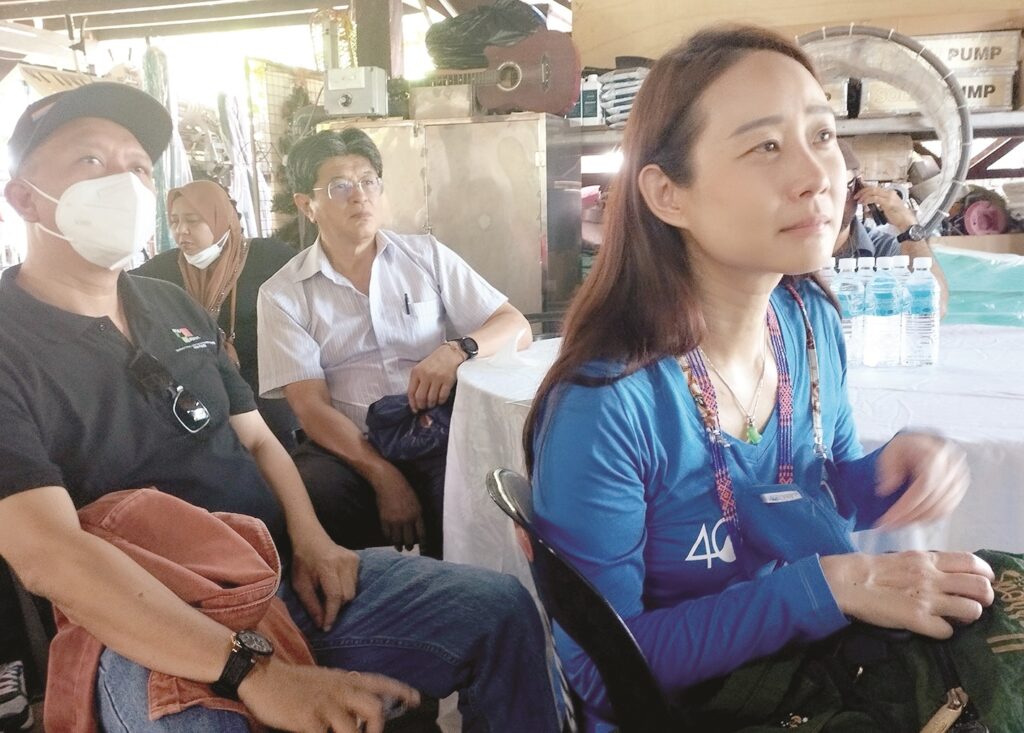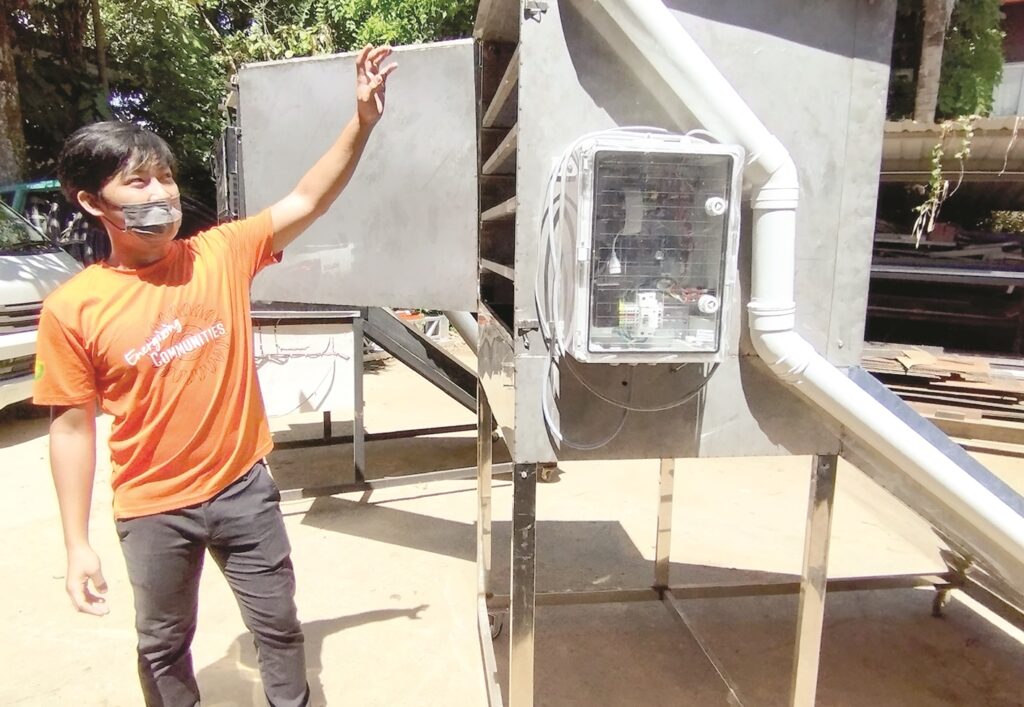
It’s historic, it’s a milestone when Kota Kinabalu City Hall hosted the Global Covenant of Mayors for Climate and Energy or GCoM National Workshop on Climate Adaptation and Climate Finance August 15-17.
EU leadership, EU Ambassador Michalis Rokas who delivered a robust speech, underscored this was serious business.
Jacqueline Chang, newly appointed Country Coordinator – Malaysia GCoM Asia Project, told Daily Express in a post-workshop interview she hoped this will inspire robust climate actions across Malaysia.
“I am so grateful to Datuk Mayor Noorliza Awang Alip and her entire staff for collaborating with GCoM Asia Project.”
“I think that by getting more than 15 cities and District Councils with us in one room for a 100pc impressive event facilitated a lot of great exchanges and I hope that they found the content of the workshop enriching and that the first thing they do when they get back to their cities is the knowledge transfer and to share what they have learnt, with the series of Climate Risks and Vulnerability Assessment (CRVA) templates that we are trying to help them complete in terms of Greenhouse gas emission inventory, and what solutions they need to think about, what are the baseline data they need to start developing climate adaptation programmes and then at the end of the day when those are done, they will have some solid proposals to go for finance,” Jacqueline told Daily Express.
Proud of MGTC’s catalyst grants for low carbon cities
“I think I am very proud that the Malaysian Green Technology Climate Change Corporation has started the Gerak Plan (Low Carbon Catalyst Grant worth RM35 million to empower high impact low carbon cities initiative) under the Ministry of Finance,” she said.
“These types of local grants and seed grants help because when you do pilot city programmes, you learn a lot- what is good, what is bad and then you can document lessons learnt before you go full fledge for the entire programme,” Jacqueline added.
Quadruple Helix – pooling govt, industry, university plus citizen intervention
Would the City Hall hosted GCoM workshop go down in history as one of the best?
Noted Jacqueline: “Can you see the quadruple helix planning that strengthens the quadruple helix?”
“What I mean by quadruple helix is that the private sector, public sector, academia and civil society must work together, the climate action plan that comes out of this must demonstrate the quadruple helix,” she explained.
“The four sectors must unite and connect the key actors along the value chain, what we need is very innovative innovations.”
Co-benefits are keys: Jacqueline
“People will jump on the bandwagon when they know there are co-benefits. Co-benefits are keys and you must walk out the room knowing it’s a win-win solution.”
She added: “You cannot dictate and say, follow me, I don’t care, you find your own solutions, we have to strive to that and that’s why sometimes I think all the regional programmes require us to crack our brains to that extent and we can’t be lenient to ourselves anymore.”
Fear has been cited as a main cause of passive climate action.
“We have to find that win-win and meet half way and if we are not sure, don’t be intimidated,” she said.
“Start with a pilot, collect the data, primary data is important, go out for survey, and when you compile the primary data, analyse it, most importantly, synthesise them and after that, communicate to the masses in simple, bite size words so that they can read it, who will say; ‘ah, I know what he is thinking about’,” Jacqueline exhorted.
Science writer concurs: Offer concrete benefits to break the ‘Time disconnect’
Jacqueline’s belief in the need for co-benefits to motivate innovative climate action solutions certainly finds support in high places.
Writing in ‘Why climate change is so hard to tackle’ in Environment & Energy, American Executive editor Amy Harder says concrete benefits are essential to break the discouraging nature of ‘Time disconnect’.
”Imagine you want Net Zero by 2050, the bottom line is climate policy would have to offer concrete benefits outside its emissions – think jobs, energy security to overcome this Time disconnect,” Harder noted.
“Climate change is cumulative but the results of other public policy issues are almost immediate, instantaneous impact on people,” Harder highlighted how long delayed benefits from climate actions may well be the real culprit behind the great collective inaction.
Fear not
Penang Mayor Yew Tung Seang noted at a press conference climate change can no longer be avoided but actions must be taken to avoid it from running out of control. The problem is fear out there induces freezing and inaction.
“But we shouldn’t fear also, psychological fear, apart from co-benefits, we need to practise association because people need logic, the way the mind works, so we don’t complicate for them. It’s a matter of communication too. If you speak to 100,000 people and they don’t walk out knowing what you said in the first five minutes or 10 minutes you haven’t succeeded,” Jacqueline said.
Love Vibrant KK & GCoM Malaysia
If the vibrant GCoM event in KK constitute action, two recent programmes must have helped.
On the KK City Hall side, Mayor Datuk Noorliza launched the Love KK Network Programme on April 1. Love Vibrant KK was one of the seven components.
Hosting the international GCoM event which includes the presence of EU Ambassador to Malaysia Michalis Rokas plus Malaysian and Asean cities was a deemed a contribution to the objectives of Love Vibrant KK and Mayor Noorliza said “yes”, according to Lifred Wong, deputy Director General (Finance) .
The other emergent programme is GCoM Malaysia, with Jacqueline Chang as the Country Coordinator, encountered for the first time since I covered the maiden GCoM convention in Johor 2019.
Her engagement and correspondence with City Hall bore fruits, in this case with Mayor agreeing to host the GCoM workshop.
Role of GCoM Malaysia Country Coordinator
As Country Coordinator – Malaysia GCoM Asia Project, Jacqueline says she is constantly touch with an expert team in capacity building under Professor Dr Ho Chin Siong, Director of Universiti Teknologi Malaysia’s Low Carbon Asia Centre.
“I observe how people interact and listen more than I speak and gain a lot more that way,” she noted.
“My role requires me to reflect a lot and all the voluminous information that comes to my desk, I need time to synthesize it but also I am hoping that it will be translated in such a way that it is very easy for the community to say yes – we want to be part of this, like how I saw in Kg Nampasan, Inobong, during a site visit.”
Witnessing an energising intervention from youths in Tonibung
“The youths energising the community under Adrain Lasimbang, it speaks so much.” Jacqueline said.
“For formal engagement in various cities and countries, I feel the youths today seem to be educating their parents more, I think they are right at the forefront, I see a passion, a fire in them, I think the site visit at Tonibung (friends of Village Development) with Adrian Lasimbang, I saw youths wearing T-shirts inscribed ‘Energising Communities’ and that in itself are two very powerful words because the communities are the nexus (link) and if you lead a radical transformation and radical change, it is the nexus that actually influence the Nationally Determined Contributions (NDC) and all those high level targets,” she said.
Malaysia’s NDC is a 45pc emission reduction target by 2030 relative to the emission intensity of GDP 2005.

Objective: Confident Mayors nationally & globally
While Jacqueline may be new to GCoM Malaysia, she is not new to its purpose because she was already a Country Coordinator for the International Urban Regional Cooperation for Australasia, when Asih Budiati, Team Leader of GCoM Asia Project asked her to perform an identical role as GCoM Malaysia Country Coordinator.
“I said okay, I’ll try my best as a Country Coordinator for two regional programmes, I hope I can share with the Mayors directly so that it propels the Local Agenda, I hope we can create not only a national but also a global platform for them so that learning is being enriched at many different levels so that when we take our Mayors regional or global they can handle, know how to represent the country, speak with pride what they have implemented, what good lessons they can share from their side and also learn from others the insights from the leaders so that when we get this pool of people together they are stronger, confident and can lead but it has to be the whole thing – top down but also bottom up,” Jacqueline elaborated her objective.
152 city councils in Malaysia to reach-big responsibility
Which means moving GCoM in Malaysia to a new height?
“I don’t know, in EU funded projects, we don’t have big titles but I can tell you big responsibility, it’s the volume and jurisdiction because we have 152 city councils in Malaysia, how many I can outreach in the balance months leading to December 2022 I don’t know, we have very high targets and very short time, therefore the implementation strategies have to be very robust but I’ll try my best,” she said.
“Of course I want my country to succeed at every level. That’s why I feel I hope by doing these regional programmes I can share as much intelligence as I can with the people on the ground.”
Eight Climate Action Plans by end of 2022
“As a Country Coordinator, I work with the implementing partner Universiti Teknologi Malaysia to ensure that all Climate Action Plans for our four new pilot cities –Putra Jaya, Petaling Jaya, Segamat and Iskandar Putri, will be completed by October this year. This is the second batch of four pilot cities, the first batch of four were Hang Tuah Jaya, Muar, Penampang and Tawau 2017-19.”
Key Federal stakeholders, Low Carbon Master Plan & finance
“So I would say by the end of 2022 Malaysia would have submitted eight Climate Action Plans and these eight Climate Action Plans will of course be shared with the Ministry of Climate and Water and the Malaysia Green Tech Climate Change Corporation,” Jacqueline said.
“These are my very key Federal stakeholders. I say this because Malaysia’s component of GCoM Asia contributes to the National Low Carbon City Master Plan.”
“In that Master Plan we have 33 pilot cities, and in that 33 cities we have nine GCoM cities and of course with our new members, I am hoping that they would benefit so that climate finance is the key.”
Why?
“Because I feel that the Malaysian Green Tech for Climate Change Corporation can drive the climate financé if they were the applicants for the pool of Councils.”
“That’s why having the Ministry of Environment and Water and the Malaysian Green Technology and Climate Change Corporation at the panel is the key,” Jacqueline highlighted finance remains the pillar of the value chain in this whole GCoM endeavour.
Hope for strong ties with Mala
Asked if she plans to engage with all the cities into GCoM, Jacqueline said:
“We have written to the Malaysian Association of Local Authorities (Mala) and of course the Mayor of Penang, Mr Yew Tung Seang is also the President of Mala with a membership of 98.”
“I am hoping that we have a stronger engagement with them and whatever knowledge we share with the GCoM member cities they will be coming on board. Malaysia should join the GCoM membership and show that we are serious and the Mayors are going to drive the agenda for the cities, that they are ready for a huge coalition.”
“This is because we cannot work in silos since there are many cities in one state but if they come in a coalition the results are better, through city to city learning, city to city cooperation, don’t work in silos, be generous on what works and what does not, everyone is really prepared and constantly upscale,” Jacqueline said.
Source : Daily Express

